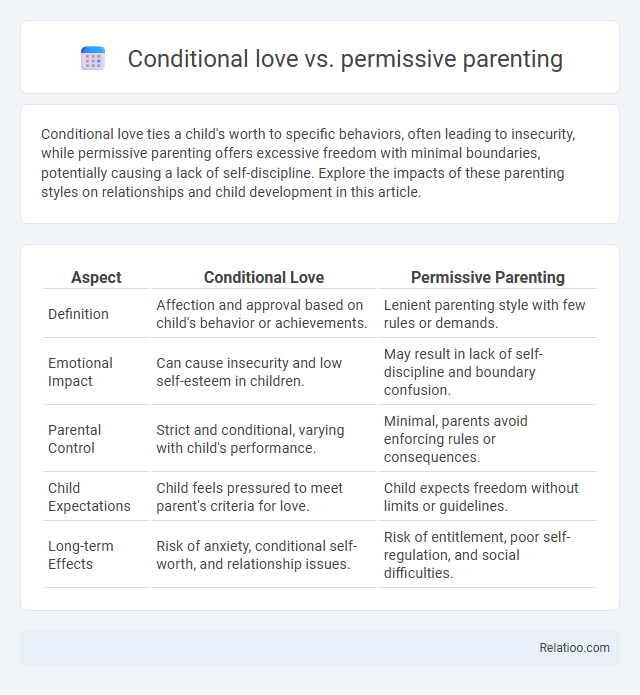Conditional love ties a child's worth to specific behaviors, often leading to insecurity, while permissive parenting offers excessive freedom with minimal boundaries, potentially causing a lack of self-discipline. Explore the impacts of these parenting styles on relationships and child development in this article.
Table of Comparison
| Aspect | Conditional Love | Permissive Parenting |
|---|---|---|
| Definition | Affection and approval based on child's behavior or achievements. | Lenient parenting style with few rules or demands. |
| Emotional Impact | Can cause insecurity and low self-esteem in children. | May result in lack of self-discipline and boundary confusion. |
| Parental Control | Strict and conditional, varying with child's performance. | Minimal, parents avoid enforcing rules or consequences. |
| Child Expectations | Child feels pressured to meet parent's criteria for love. | Child expects freedom without limits or guidelines. |
| Long-term Effects | Risk of anxiety, conditional self-worth, and relationship issues. | Risk of entitlement, poor self-regulation, and social difficulties. |
Understanding Conditional Love in Parenting
Understanding conditional love in parenting helps you recognize how affection depends on a child's behavior, creating insecurity and emotional distress. Permissive parenting, by contrast, offers unconditional affection but lacks firm boundaries, potentially leading to behavioral issues. Balancing unconditional love with consistent discipline fosters healthier emotional development and secure parent-child relationships.
What is Permissive Parenting?
Permissive parenting is characterized by high responsiveness but low demands, where parents are indulgent and avoid setting strict boundaries or rules. This parenting style often leads to children struggling with self-discipline and authority due to the lack of consistent structure. Unlike conditional love, which depends on meeting specific expectations, permissive parenting provides love and acceptance with minimal restrictions, potentially hindering the development of responsibility.
Core Differences Between Conditional Love and Permissive Parenting
Conditional love is based on meeting specific expectations to receive affection, often leading to insecurity in children, while permissive parenting emphasizes high warmth with few rules or demands, encouraging independence but sometimes resulting in lack of discipline. The core difference lies in emotional responsiveness: conditional love restricts acceptance to certain behaviors, whereas permissive parenting offers acceptance without enforcing boundaries. Understanding these distinctions helps you foster a healthy balance of support and structure in your parenting approach.
Psychological Impact of Conditional Love on Children
Conditional love often leads to feelings of insecurity and low self-esteem in children, impacting their emotional development and relationships. Permissive parenting may result in a lack of boundaries, but conditional love specifically fosters anxiety due to the child's constant need for approval. Your understanding of these differences is crucial for promoting healthier emotional growth and resilience in children.
Effects of Permissive Parenting on Child Development
Permissive parenting, characterized by high responsiveness and low demands, often leads to children developing poor self-discipline, impulsivity, and difficulty respecting boundaries. Compared to conditional love, which depends on meeting specific criteria and can cause insecurity in a child's emotional development, permissive parenting fosters a lack of structure that impairs social skills and academic performance. The absence of consistent rules under permissive parenting can hinder a child's ability to develop responsibility and resilience.
Emotional Outcomes: Comparing Both Approaches
Conditional love often leads to emotional insecurity and anxiety in children, as their self-worth becomes tied to meeting specific expectations. Permissive parenting, characterized by low demands and high responsiveness, may result in poor emotional regulation and difficulty handling boundaries. Your choice between these approaches significantly influences your child's emotional resilience and overall mental health.
Discipline and Boundaries: Conditional vs Permissive Styles
Conditional love often ties affection to specific behaviors, leading to rigid discipline and strict boundaries that hinge on meeting set expectations. Permissive parenting blurs these boundaries, offering minimal discipline and consistent leniency, which can undermine your child's ability to understand limits. Understanding the distinctions in discipline and boundaries between conditional and permissive styles helps you create a balanced environment fostering respect and emotional security.
Building Secure Attachments: Which Approach Works?
Building secure attachments requires consistent emotional support, which is often undermined by conditional love that ties affection to behavior. Permissive parenting, while less restrictive, can lead to insecurity due to lack of clear boundaries and guidance. Your child's sense of safety and trust is best fostered through unconditional love combined with consistent, empathetic parenting practices.
Expert Insights: Best Practices in Positive Parenting
Experts in positive parenting emphasize unconditional love as a foundation for healthy child development, highlighting that conditional love may undermine self-esteem and emotional security. Permissive parenting, characterized by high responsiveness but low demandingness, often leads to a lack of boundaries, which experts caution can hinder the development of self-discipline and responsibility. Best practices recommend balanced parenting approaches combining warmth and consistent limits to foster resilience, emotional intelligence, and positive behavior in children.
Striking a Balance: Healthy Love and Effective Discipline
Striking a balance between conditional love and permissive parenting is essential for fostering healthy emotional development and effective discipline in your child. Conditional love, where affection depends on behavior, can undermine self-esteem, while permissive parenting often lacks boundaries, leading to behavioral issues. Implementing consistent, clear expectations combined with unconditional affection helps create a nurturing environment that promotes both discipline and emotional security.

Infographic: Conditional love vs Permissive parenting
 relatioo.com
relatioo.com